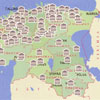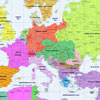Political and Social Conditions
 Estonia's miniscule size and geographical proximity to large powers have meant that throughout its history, it has been politically and economically dominated by other countries. From the 13th to the early 18th centuries, Estonia's development was largely shaped by European powers. By the early 1700s, the Russian empire acquired Estonia from Sweden through the Treaty of Nystad. Estonia was thrust into a difficult situation whereby its political landscape was controlled by Russian Tsars. Meanwhile, a large majority of the Estonian population remained subservient to the wealthy German landlords who owned much of the land. Spurred on by increased attempts of Russification in the late 19th and early 20th centuries, Estonian nationalism soon developed as a cultural and political response. Culturally, Estonian nationalism was exemplified by the establishment of Estonian language literature, music, and theatre. Politically, many Estonians longed for greater autonomy. These discontents were expressed through massive emigration and, eventual independence from the Russian empire.
Estonia's miniscule size and geographical proximity to large powers have meant that throughout its history, it has been politically and economically dominated by other countries. From the 13th to the early 18th centuries, Estonia's development was largely shaped by European powers. By the early 1700s, the Russian empire acquired Estonia from Sweden through the Treaty of Nystad. Estonia was thrust into a difficult situation whereby its political landscape was controlled by Russian Tsars. Meanwhile, a large majority of the Estonian population remained subservient to the wealthy German landlords who owned much of the land. Spurred on by increased attempts of Russification in the late 19th and early 20th centuries, Estonian nationalism soon developed as a cultural and political response. Culturally, Estonian nationalism was exemplified by the establishment of Estonian language literature, music, and theatre. Politically, many Estonians longed for greater autonomy. These discontents were expressed through massive emigration and, eventual independence from the Russian empire.
 Dissatisfied with the status quo in their homeland, many Estonians opted to venture by foot across Europe and to establish several communities in Russia's vast empire, including Tver and other locations in the Ural Mountains. One such notable location was Crimea, situated on the northern tip of the Black Sea. Seeking better living conditions and greater freedoms, migrant Estonians soon discovered that Crimea was barren and desolate, primarily the result of the violent and economically disastrous Crimean War (1853-1856). They were generally not discouraged however, as Crimea provided workable land free of German economic interests. Through industrious, ambitious, and productive work, Estonians settling in Crimea soon became prosperous landowners.
Dissatisfied with the status quo in their homeland, many Estonians opted to venture by foot across Europe and to establish several communities in Russia's vast empire, including Tver and other locations in the Ural Mountains. One such notable location was Crimea, situated on the northern tip of the Black Sea. Seeking better living conditions and greater freedoms, migrant Estonians soon discovered that Crimea was barren and desolate, primarily the result of the violent and economically disastrous Crimean War (1853-1856). They were generally not discouraged however, as Crimea provided workable land free of German economic interests. Through industrious, ambitious, and productive work, Estonians settling in Crimea soon became prosperous landowners.
 Despite these economic gains, Estonians living in Crimea remained politically subservient to the Russian empire. While Crimea experienced relative freedom in the 19th century, it formally fell under Russia's jurisdiction. Mandatory military service for example, was required for all men over the age of 18. This rule applied to most Estonian men. As many families did not want to lose their sons to the Russian Army, the possibility of moving, once again, became a distinct reality.
Despite these economic gains, Estonians living in Crimea remained politically subservient to the Russian empire. While Crimea experienced relative freedom in the 19th century, it formally fell under Russia's jurisdiction. Mandatory military service for example, was required for all men over the age of 18. This rule applied to most Estonian men. As many families did not want to lose their sons to the Russian Army, the possibility of moving, once again, became a distinct reality.








